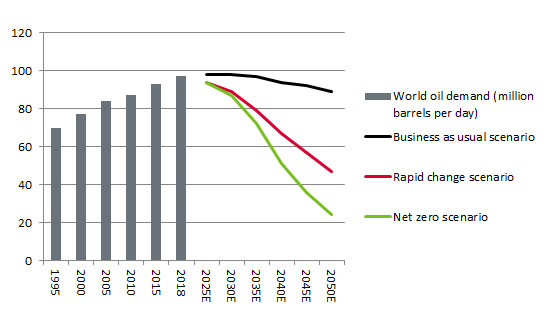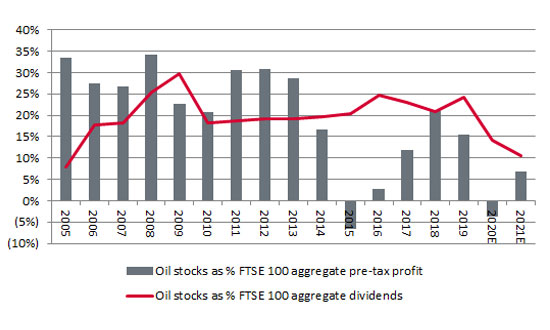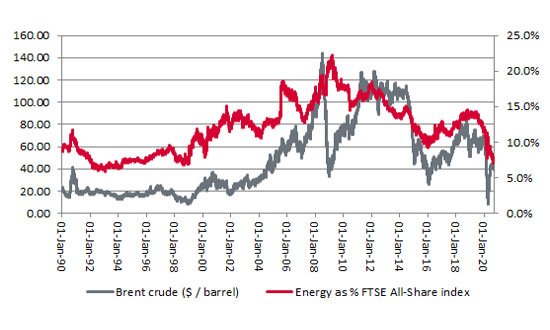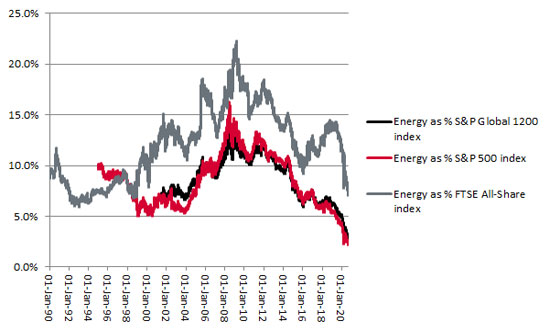


BP’s latest annual World Energy Outlook – released in conjunction with this week’s three-day presentation from Chief Executive Bernard Looney and team, outlining the oil major’s new strategy – offers three scenarios for demand for crude oil in 2050. They range from 89 million barrels a day, barely 10% below 2019’s peak of 98 million as nothing much changes politically or socially, all the way down to 24 million, as the world goes carbon neutral.
“BP’s latest annual World Energy Outlook offers three scenarios for demand for crude oil in 2050, ranging from 89 million barrels a day, barely 10% below 2019’s peak of 98 million, all the way down to 24 million, as the world goes carbon neutral, for a 75% drop.”
BP’s research suggests oil demand could fall by 75% by 2050

Source: BP World Energy Outlook 2020
The possibility that oil demand could go down by three quarters between now and 2050 means Mr Looney’s desire to prepare BP for a zero-carbon world is perfectly understandable.
It also leaves advisers and clients with a decision to make. They need to assess any actively-managed UK equity funds that they own and make sure they are comfortable with any weighting toward BP and their chosen fund managers’ faith in the company. Funds with big weightings are backing Mr Looney and the company’s ability to reinvent itself in time, a plan made all the more complicated by the way weak oil prices are depriving BP of vital cash flow, just when it needs to invest heavily in both its new strategy and the maximisation of value from hydrocarbon assets where there are already considerable sunk costs.
“Analysts’ consensus forecasts for 2021 assume that BP and Royal Dutch Shell will generate between them 7% of total FTSE 100 profits and 11% of the headline index’s total dividend payout.”
Advisers and clients who prefer the passive route to market via trackers and Exchange-Traded Funds (ETFs) also have a decision to make. Analysts’ consensus forecasts for 2021 assume that BP and Royal Dutch Shell will generate between them 7% of total FTSE 100 profits and 11% of the headline index’s total dividend payout.
Whether such forecasts are reliable, too optimistic or too conservative will be especially important for investors in passive, tracker funds, as they indirectly own BP and Shell whether they like it or not.
For those investors who do not wish to embrace oil stocks, for financial or philosophical reasons (or both), the good news at least is that those consensus analysts’ forecasts mean that:
UK oil majors’ forecast profit and dividend contributions to FTSE 100 totals continue to ebb

Source: Company accounts, Sharecast, consensus’ analysts forecasts
“The FTSE All-Share Oil & Gas Producers sector is now worth just 7.1% of the FTSE All-Share itself, a fraction above 1992’s modern-day low of 6.3% and almost identical to 1998’s cyclical trough of 7.0%.”
These numbers at least explain why oil shares are doing so badly. The FTSE All-Share Oil & Gas Producers sector is now worth just 7.1% of the FTSE All-Share itself, a fraction above 1992’s modern-day low of 6.3% and almost identical to 1998’s cyclical trough of 7.0%.
UK Oil sector weighting is near all-time lows

Source: Refinitiv data
Those dates are interesting because BP cut its dividend in 1992 (just as it has done this year), while crude oil prices dipped briefly below $10 a barrel in late 1998, just as they did this spring.
On a global basis, oil shares’ weighting in the S&P Global 1200 index and America’s S&P 500 benchmark stands at record lows of 2.9% and 2.2% respectively. The S&P 1200 Energy index’s valuation of $1.3 trillion means the industry currently carries a lower price tag than Microsoft and is worth barely four times more than Tesla, whose current car volume sales are tiny, at least for now, at around 100,000 units per quarter.
Global Oil sector weighting is already at all-time lows

Source: Refinitiv data
Advisers and clients with exposure to individual oil firms, specialist energy funds (be they active or passive) or geographic stock indices with a hefty exposure to oil companies (which would include the FTSE 100) must now decide whether this marked bout of oil stock underperformance is merely cyclical or the result of something more structural.
“If BP’s ‘zero-carbon’ demand scenario holds true, even the most wilfully contrarian investor may struggle to make a case for exposure to oil stocks but if the ‘no change’ case pans out, owing to political or social inertia, the picture could be very different.”
If the BP ‘zero-carbon’ scenario holds true, even the most wilfully contrarian investor may struggle to make a case for exposure to oil stocks, at least until the earnings mix begins to truly slant away from hydrocarbons, as it is hard to divine what could be a catalyst for higher oil prices and thus higher earnings.
Yet if the ‘no change’ case pans out, owing to political or social inertia, the picture could be very different. Demand could recover in a post-pandemic world and do so just as oil majors cut investment, US shale output falls and global oilrig activity is down more than 50% year-on-year. That could make for a surprise cyclical comeback from an industry that financial markets seem to be writing off – the FTSE All-Share Oil & Gas Producers index rose 50% in 2016, the year after BP and Shell last made a combined loss, just as they are forecast to do in 2020.
This area of the website is intended for financial advisers and other financial professionals only. If you are a customer of AJ Bell Investcentre, please click ‘Go to the customer area’ below.
We will remember your preference, so you should only be asked to select the appropriate website once per device.